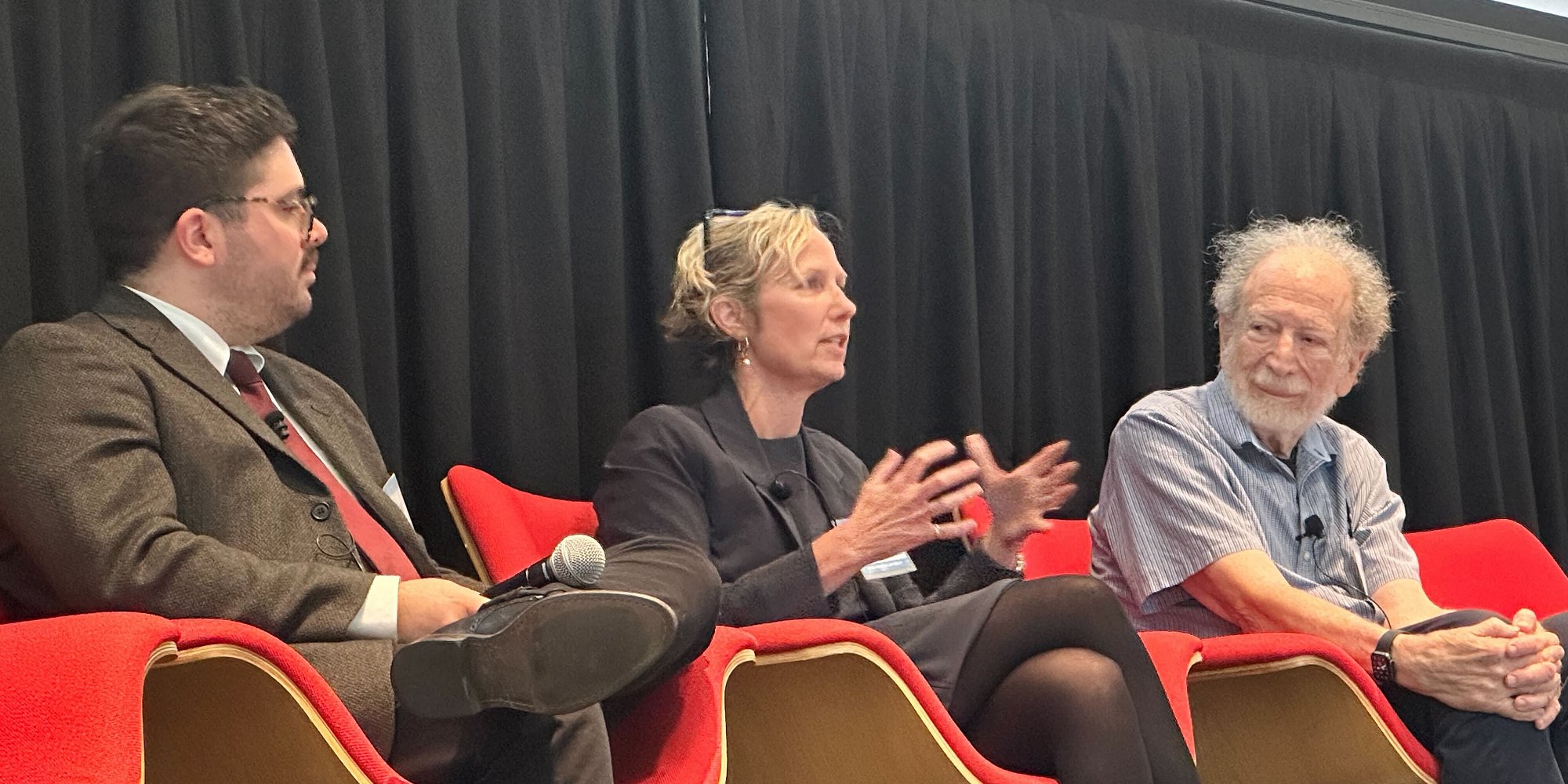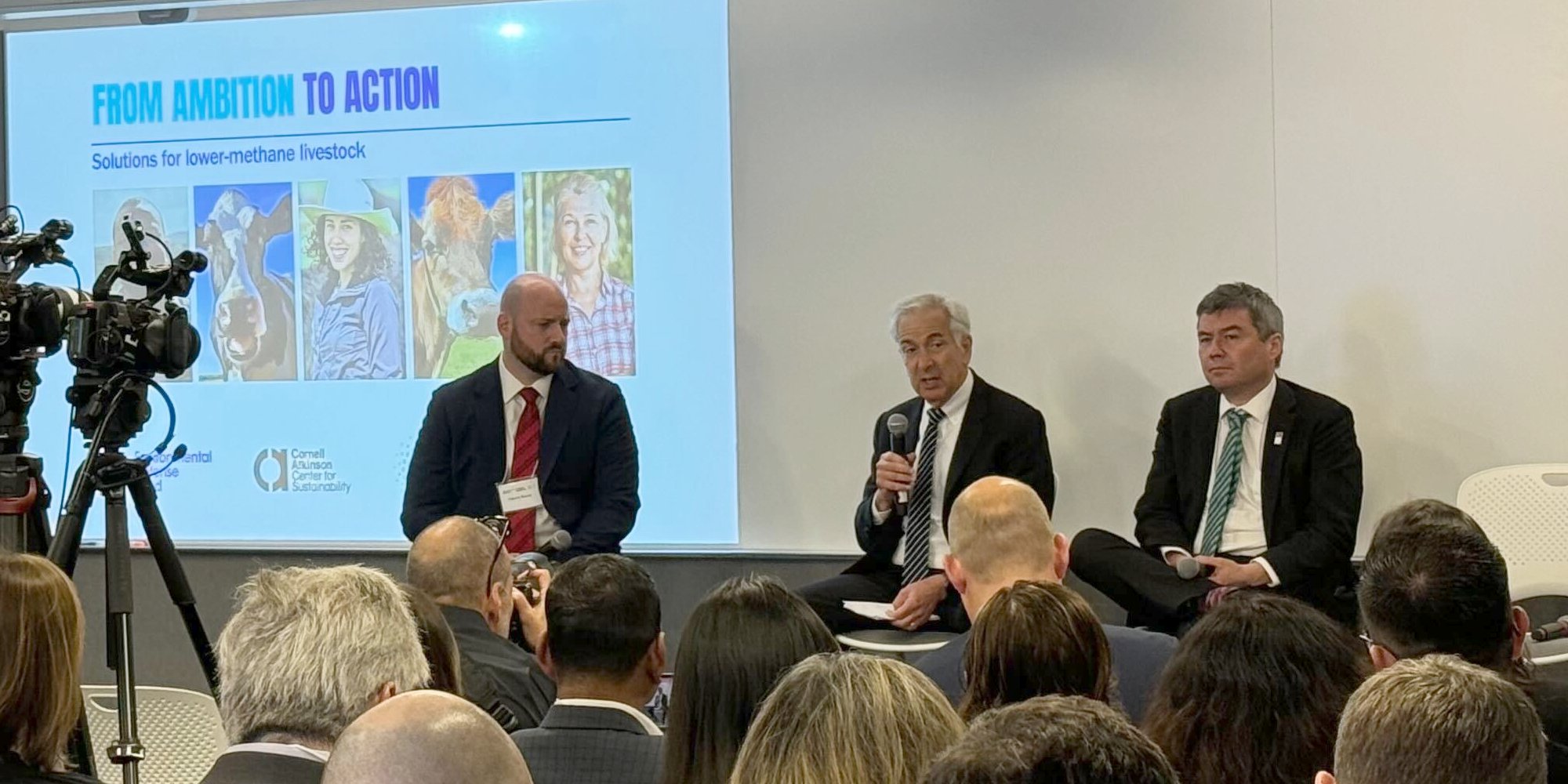Last week I took part in Climate Week NYC – an annual gathering of politicians, researchers, activists, corporate figures, and non-profit leaders to grapple with some of the biggest challenges in climate change.
In venues across the city, decisionmakers sat on panels and held private meetings to chart out their ambitions to reduce human contribution to climate change and prepare our world for the changes to come, while balancing the many other challenges facing people around the world, from political instability and poverty to threats of war.
Cornell University researchers had quite a presence. Over the week, Cornell faculty and researchers were featured in more than a dozen events on topics ranging from nuclear energy to livestock methane to biodiversity loss.
A few key themes emerged for me from these events and other informal and formal conversations with fellow participants over the course of the week.
Getting Real About Goals – Governments and companies across the world have set very ambitious climate-related goals, many with a target date of 2025, 2030, or 2035. As the deadlines for these lofty once-distant goals approach, many institutions are feeling the heat to deliver, and in some cases to adjust or shift them to focus on what is practical and possible. New York state set a goal to have a 70% renewable electricity grid by the year 2030, and it is increasingly clear that meeting that goal will be unlikely.
Turning Money Into Tangible Projects – Hundreds of billions of dollars of federal funds for energy and climate projects are now available thanks to the passage of major pieces of legislation including the Inflation Reduction Act (IRA) and the Bipartisan Infrastructure Law. The focus is now on turning these new dollars, largely in the form of new tax credits, into new sources of electricity, battery plants, clean manufacturing facilities, electric vehicles, transmission lines, and other critical projects. This means supporting private investors and public entities in taking advantage of these opportunities: addressing workforce, materials, and supply-chain bottlenecks; navigating regulatory barriers or local opposition to new projects; and reforming processes like the interconnection queue and the transmission planning process for the new generation of clean energy technologies. At an event hosted by the Center for Public Enterprise, representatives from the U.S. Treasury, the New York Power Authority, and the Minnesota Climate Innovation Finance Authority talked about how their jurisdictions were taking advantage of the IRA tax credits, including through the use of public authorities, to accelerate the construction of new projects.
Embracing Energy Prosperity and Managing Growing Electricity Demand – Addressing climate change in a politically durable and humane way will mean meeting the energy needs of the billions of people around the world currently living with limited access to electricity, cooking fuel, and heat. In richer countries, our electricity needs are rising for the first time in decades as we seek to electrify homes and vehicles, expand domestic production and industrial facilities, and embrace next generation technologies like artificial intelligence and their associated energy needs. The common need across these ambitions: plentiful, inexpensive, reliable, and clean electricity capable of meeting the needs of an increasingly prosperous and technologically advanced global population. These ambitions were central to the discussion at Nuclear Symposium 2024: Uplifting Humanity, which featured speakers from the White House, the Nature Conservancy, the Department of Energy (DOE) Loan Program Office, the Ghana energy ministry, and representatives of companies from all phases of the nuclear industry, including generation, fuel recycling, and storage.

Pairing Deployment and Innovation – There are many appealing technologies to reduce emissions now while maintaining or improving quality of life, including electric vehicles, ever-cheaper renewables, heat pumps, and induction stoves. But there is a continued need for innovation to provide low-emission alternatives and continue to drive down costs and improve the quality of a lower-emissions life. At an event co-sponsored by Cornell Atkinson and our close partners at Environmental Defense Fund, faculty spoke to their work driving innovation in reducing agriculture emissions, like developing new feed additives to reduce methane emissions from livestock. At the Activate Fellows Hard Tech Showcase, I spoke with entrepreneurs working on a range of climate innovations, from detecting methane and refrigerant leaks in building systems, to new methods for carbon capture and utilization, to detecting and extracting geological hydrogen.

No One Problem, No One Solution – Climate change presents a range of challenges to humanity and exacerbates many others already present. The “solution” – whether to heat deaths, intense storms, energy access, or biodiversity loss – will not be any one thing, but a range of policies and investments to improve quality of life and protect what we value most while reducing the hazardous side effects of fossil fuel use and emission accumulations. Our faculty took an open-minded posture on investments – ranging from protecting ecosystems and preserving biodiversity to exploring sunlight reflection methods – to reduce the worst effects of climate change while maintaining a habitable biosphere for humans and nature to flourish.
In all, my primary takeaway was optimism. These problems are substantial, but we’re on it. The work continues to develop breakthrough technologies, craft strategic policy, and train the next generation of thinkers and doers to take on the climate challenge and support human flourishing in the century to come.
Learn more about Ben Furnas, Executive Director of The 2030 Project
